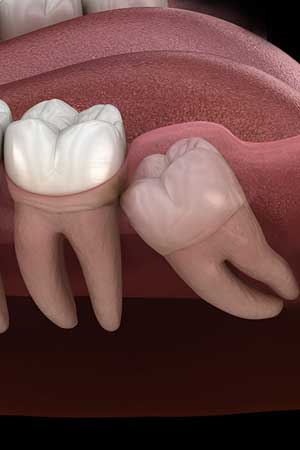X
Locations
Madhapur Plot No, 172, Rd Number 9, Ayyappa Society, Chanda Naik Nagar, Madhapur, Hyderabad, Telangana - 500072 Gayatri Nagar Plot no 298, beside sbi bank, Gayatri Nagar, Allapur, Borabanda, Hyderabad, Telangana - 500018 Miyapur H.no 1-258, opposite IndusInd bank, miyapur X Road, Miyapur, Hyderabad - 500049 Madhapur H.no: 2-56/23/15/5, ground floor, sainagar,madhapur, Hyderabad - 500081Wisdom tooth removal is also called third molar extraction, is a common dental procedure where at least one of the four wisdom teeth at the back of the mouth are eliminated. Wisdom teeth are the last set of molars to come in, ordinarily arising between the ages of 17 and 25, however the timing can vary from one individual to another.
Why is it done?
You could require tooth removal if you:
- Have one or more impacted wisdom teeth (Impacted means partially or completely trapped in your gums or jawbone.)
- Have wisdom teeth that grew in crooked or sideways.
- Develop pain close to the back of your mouth.
- Trap food and debris around your wisdom teeth.
- Develop gum disease, especially around your molars.
- Have tooth decay (cavities) in a partially erupted wisdom tooth.
- Develop a cyst (fluid filled sac) around one or more wisdom teeth.
- Have damage to nearby teeth or encompassing bone.

Procedure
- The Procedure: The procedure is usually performed by a dentist or oral surgeon. Before the extraction, you will receive local anesthesia or, in some cases, general anesthesia to numb the area and ensure you don't feel any pain during the procedure.
- The dentist or oral surgeon will then make an incision in the gum to expose the tooth and bone. If needed, they might remove any bone that blocks access to the tooth. The tooth is then extracted either in one piece or divided into smaller sections for easier removal. After the tooth is removed, the area is cleaned, and the incision is stitched closed.vv
Recovery
Recovery time can vary depending on the complexity of the extraction and individual factors. Here are some general tips to promote healing:
- Follow post-operative instructions: Your dentist or oral surgeon will give you specific post-operative care instructions. It's necessary to follow these carefully in promoting healing and reducing the risk of complications.
- Manage pain and swelling: You might experience some discomfort and swelling after the procedure. Pain medications and cold packs can help manage these symptoms.
- Soft diet: Stick to soft foods and liquids initially to avoid putting too much pressure on the healing region.
- Oral hygiene: Keeping the mouth clean is crucial. However, be gentle and avoid brushing or flossing directly around the extraction site for the first few days.
- Avoid certain activities: Refrain from smoking, using straws, or engaging in strenuous physical activities for a few days to allow proper healing
What happens after wisdom teeth removal?
After the removal of wisdom teeth, you can expect mild discomfort, slight bleeding and swelling. Your oral surgeon will give you instructions for wisdom teeth management to ease these side effects.
